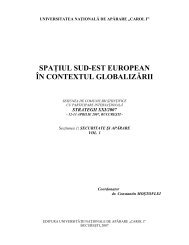PROVOCĂRI LA ADRESA SECURITĂŢII ŞI STRATEGIEI LA ÎNCEPUTUL SECOLULUI XXI
provocări la adresa securităţii şi strategiei la începutul secolului xxi
provocări la adresa securităţii şi strategiei la începutul secolului xxi
Create successful ePaper yourself
Turn your PDF publications into a flip-book with our unique Google optimized e-Paper software.
Treaty. Their additional purpose is to protect the Polish interests and to build<br />
Poland’s position on NATO and the European Union.<br />
Poland performs its security policy according to the Constitution of<br />
the Republic of Poland with respect to the international law, according to the<br />
objectives and principles of the Charter of the United Nations and<br />
documents of the Organisation for Security and Cooperation in Europe<br />
(OSCE), as well as according to the spirit and letter of international treaties<br />
and conventions which it is a party. Treating its borders as unalterable,<br />
Poland has no territorial claims, and has relations regulated by treaties with<br />
all its neighbours.<br />
Poland doesn’t intend to strengthen its own security at the expense<br />
of security of others. In its activities on the arena of international politics<br />
Poland follows the values, ideals and principles contained in the North<br />
Atlantic Treaty and European Union Treaties, in order to realise the vision<br />
of free and democratic Europe where security, prosperity and favorable<br />
conditions for cultural development and maintenance of identity constitute<br />
the common and indivisible good of the uniting continent 3 . Poland strictly<br />
connects its security with the security of NATO countries and members of<br />
the European Community. Poland fulfils its own security interest mostly in<br />
the frame of the North Atlantic Treaty Alliance system of cooperation and<br />
solidarity, by supporting international efforts aimed to strengthen the<br />
security in Europe and throughout the world, to protect the basic human<br />
right. Poland supports the idea that the use of force on the international<br />
arena should be limited exclusively to exercising the right for self-defence,<br />
as provided in the United Nations Charter, or in the context of operations<br />
carried out on the basis of international community mandate. At the same<br />
time, Poland is willing to strongly oppose all those who show aggression<br />
and break the human rights. While addressing the essence of my<br />
presentation I would like to concentrate myself on the primary documents<br />
dealing with the issues of security and defence of the Republic of Poland –<br />
the National Security Strategy and the Military Strategy.<br />
National Security Strategy<br />
After the meeting of the National Security Council in September 8 th<br />
2003, the President of the RP signed the National Security Strategy of the<br />
Republic of Poland adopted by Polish Government in July 22 nd . It took<br />
place just 3 years after the adoption of the previous National Security<br />
Strategy by the Government in January 2000.<br />
3<br />
J. Gryz „Zagrozenia bezpieczenstwa Rzeczypospolitej” In System bezpieczenstwa<br />
Rzeczypospolitej Polskiej, edited by R. Kulczycki, AON Warszawa 2004, Vol. I, 6-7.<br />
51<br />
The National Security Strategy is the document that specifies the<br />
goals and directions of all State institutions’ activities in the national<br />
security area 4 . The strategy not only identifies the main threats to Poland,<br />
but it also lists the tasks of different state institutions responsible for the<br />
security of the Republic of Poland. What is particularly worth emphasising<br />
is that the new strategy does not limit the goals of the security policy to the<br />
issues related to the sovereignty and territorial integrity. Security is treated<br />
much broader. Therefore, in the last chapter of the document, economical<br />
bases of security are considered.<br />
We can read that today, Poland finds itself in particularly<br />
favourable security environment. The threat of a considerable military<br />
conflict in Europe almost disappeared. However, we should realise the<br />
nature of security environment is changeable. In fact, one of such significant<br />
changes in our security policy is a shift of emphasis from the classical<br />
threats such as an armed invasion that decrease in importance, towards the<br />
unconventional, often unpredictable threats that derive from hardly<br />
identifiable non-state entities. The line of the distinction between the<br />
external and internal security aspects becomes blurred, and the new<br />
character and scale of threats appeared such as terrorism, an uncontrolled<br />
proliferation of weapons of mass destruction and means of their delivery, an<br />
organised international crime – both in character such as trafficking of arms,<br />
dangerous materials, persons and drugs, and in term of modus operandi such<br />
as corruption, money washing, financial system destabilisation. As a result,<br />
the need of a new approach to security issues is required.<br />
Polish national security policy is characterised by invariability of<br />
the goals and principles on the one hand, however, it is flexible to the new<br />
challenges on the other hand. It refers to the protection of Poland’s<br />
sovereignty, independence, inviolability of borders, and territorial integrity.<br />
It also refers to the security of the citizens, human rights, fundamental<br />
freedoms, democratic order, stable conditions for Poland’s civilisational and<br />
economic progress, human well-being, protection of national heritage and<br />
national identity, implementation of the alliance commitments, as well as to<br />
the protection and promotion of Polish interests. In the long term, the status<br />
of the State’s security will depend on how it copes with the complex<br />
challenges that call for measures going beyond the conventional instruments<br />
and methods of the security strategy. Mainly it refers to economic,<br />
environmental and human problems.<br />
The new challenges in the security area necessitate the complex<br />
approach, as the line of distinction between the external and internal security<br />
4 http://www.spo.wp.mil.pl and PPT presentation by the MoND of the Republic of Poland<br />
(Defence Policy Department).<br />
52




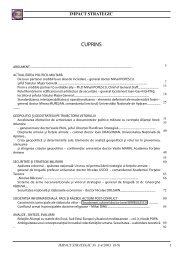
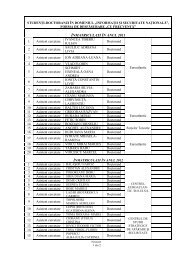
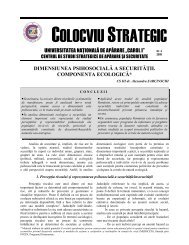
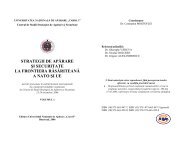
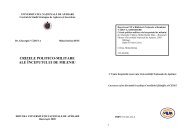
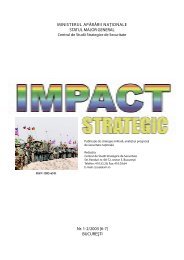


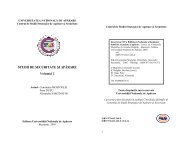
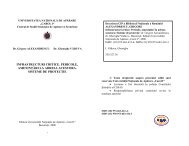
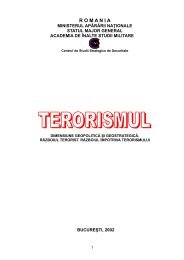

![„CAROL Nr 4 [29]/2008](https://img.yumpu.com/53801719/1/184x260/carol-nr-4-29-2008.jpg?quality=85)
